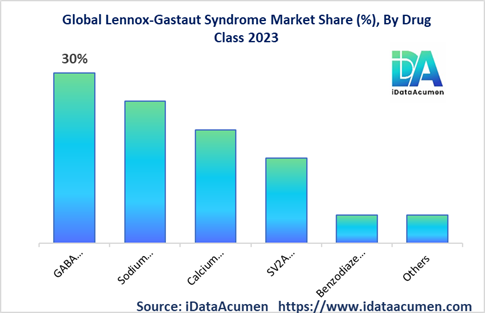Global Lennox Gastaut Syndrome Market is expected to reach US$ 1,366.9 Mn by 2031 with a growth rate of 11.8%.
Lennox-Gastaut syndrome (LGS) is a rare and severe childhood-onset epilepsy disorder characterized by multiple seizure types, intellectual disability, and developmental delays. It is treated using anti-epileptic drugs, vagus nerve stimulation, ketogenic diet, and sometimes surgery. The increasing prevalence of LGS globally is a major factor expected to drive market growth.
Advances in genetic testing now allow better identification of underlying mutations driving LGS progression. This enables personalized treatment approaches. Moreover, companies are investing significantly in developing innovative therapies like SV2A inhibitors, cannabidiol drugs, neurostimulation devices etc. Regulatory incentives also promote drug development.
The market is anticipated to expand substantially owing to rising disease burden, favorable policies, growing awareness, and launch of emerging therapies. However, issues like side effects of pharmacotherapy, high costs, low awareness in developing regions, misdiagnosis, patent expiries etc. may restrain rapid progress. Overall, the unmet need for better LGS control and ongoing research paints a favorable outlook.
The global LGS market was valued at USD 560 million in 2023, and is expected to expand at a compound annual growth rate (CAGR) of 11.8% from 2023 to 2031 to reach USD 1,366.9 million by 2031. Key factors powering rapid growth include rising LGS prevalence globally, launch of novel therapies, increased drug repurposing efforts, and integration of advanced technologies like gene sequencing, neuroimaging, and digital health into management. Europe accounted for the second largest share of the LGS market in 2022, driven by high epilepsy incidence and access to novel treatments. Leading players like Eisai, Zogenix, Lundbeck, GW Pharmaceuticals etc. with innovative product portfolios dominate regional revenues. However, high costs of therapy, patent expiries, side effects, and misdiagnosis rates may restrain the market.
Drivers:
- Increasing disease prevalence - The prevalence of LGS is rising globally with incidence estimated at 2 per 100,000 children per year in the US. This expanding patient pool will drive demand for therapies.
- Favorable regulatory policies - Regulatory incentives like expedited approvals, Orphan Drug Designation etc. are promoting development of novel therapies for the underserved LGS population.
Trends:
- Use of genetic testing - Advances in genetic sequencing enable better elucidation of underlying LGS-associated mutations guiding treatment.
- Patient-centric drug delivery solutions - Innovative delivery methods like nasal sprays, oral solutions etc. are emerging to improve usability and outcomes.
Opportunity:
Integration of digital health tools like mobile apps and wearables to support LGS management.
Key Report Insights:
- North America accounted for the largest share of 45% in the LGS market in 2022, driven by high diagnosis rates and presence of key players like Zogenix, GW Pharmaceuticals, and Supernus Pharmaceuticals. Favorable reimbursement policies also augment market access.
- Europe was the second largest market with 32% share in 2022, aided by rising pediatric epilepsy prevalence and new drug launches from companies like Eisai, Lundbeck, Arvelle Therapeutics etc.
- Leading companies operating in the global LGS market include Eisai, Zogenix, GW Pharmaceuticals, Lundbeck, Supernus Pharmaceuticals, Marinus Pharmaceuticals, Johnson & Johnson, Sunovion Pharmaceuticals, UCB, and SK Life Science. These players have strong product portfolios and R&D capabilities.

Lennox Gastaut Syndrome Market Segmentation:
- By Drug Class
- GABA modulators
- Sodium channel blockers
- Calcium channel blockers
- SV2A modulators
- Benzodiazepines
- Others
- By Route of Administration
- Oral
- Intravenous
- Intranasal
- Transdermal
- Others
- By Distribution Channel
- Hospital Pharmacies
- Retail Pharmacies
- Online Pharmacies
- Others
- By Age Group
- Infants & Toddlers (0 - 2 years)
- Children (3 - 12 years)
- Adolescents (13 - 18 years)
- Adults (>18 years)
- By Treatment Type
- Monotherapy
- Adjunctive/Combination Therapy
- Vagus Nerve Stimulation
- Ketogenic Diet
- Others
- By Region
- North America
- Europe
- Asia Pacific
- Latin America
- Middle East & Africa
Definition:
“Lennox-Gastaut syndrome (LGS) is a rare and severe childhood-onset epilepsy disorder characterized by multiple seizure types, developmental delay, and intellectual disability. It usually begins between ages 3 to 5 years. LGS causes drop seizures or atonic seizures leading to frequent falls and injuries. It is difficult to treat with seizures continuing into adulthood in most cases. LGS treatment involves use of anti-epileptic drugs, vagus nerve stimulation, ketogenic diet, and sometimes surgery to control seizures and improve quality of life. The exact causes of LGS are unknown but may involve brain malformations, inherited gene defects, or damage from illness.”